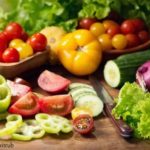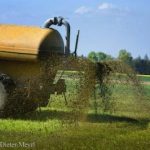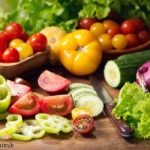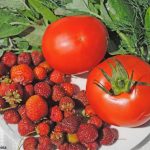Summer is a time when everyone enjoys eating more fresh produce. But there have been many foodborne illness outbreaks in the past few years linked to fresh fruits and vegetables. Some of the pathogens in those outbreaks include Salmonella, E. coli, Listeria monocytogenes, and cyclospora. The FDA is offering tips to help you choose and serve fresh produce safely. Harmful bacteria can be in the irrigation water used in the fields. Animals can poop on the plants, transferring pathogenic bacteria onto the fruits and vegetables. Product can also be contaminated during harvest, processing, or transport. When you buy produce, always choose products that are not damaged, cut, or bruised. Those injuries are open doorways to pathogens. Once the pathogens are inside the fruit or vegetable, … [Read more...]
FDA Releases Commodity Sampling Test Results on Raw Milk Cheese
The FDA released test results of commodity sampling last week. The products sampled were raw milk cheese aged 60 days, cucumbers, and hot peppers. This sampling program is part of an effort to help ensure food safety. This program was adopted in 2014 to learn more about the prevalence of disease-causing bacteria in foods and to help the agency identify patterns to help prevent future contamination. Raw milk cheese aged 60 days was one of the commodities selected for the first year of testing. Evidence indicates that aging this product for 60 days may not eliminate or adequately reduce disease causing bacteria, posing a hazard. People may still get sick with E. coli, Salmonella, or Listeria monocytogenes infections if they eat these cheeses. And they can suffer serious complications, … [Read more...]
Safety of Raw Manure Questioned Under FSMA Rule
The safety of raw manure under the Food Safety Modernization Act (FSMA) final rule on produce safety is being questioned by the FDA. Submissions on assessing the risk of raw manure as fertilizer are requested. Manure from cattle, chickens, horses, and other farm animals can be, and usually are, contaminated with E. coli and Salmonella bacteria. The FDA is going to conduct a risk assessment to find out how much consumer health is put at risk by the use of raw manure as fertilizer in growing crops covered FSMA's produce safety rule. The agency wants helps of stakeholders, the animal agriculture industry, academia, and members of the public. Produce is the most common food source linked with food poisoning outbreaks. Recent outbreaks just in the past few weeks linked to raw produce … [Read more...]
Jack and the Green Sprouts MN and WI E. coli Outbreak: Protect Yourself
The FDA has released information on how to select and serve produce safely, which is timely considering the two current outbreaks linked to raw sprouts. An E. coli O157:NM outbreak in Minnesota and Wisconsin has sickened at least 9 people, and a Salmonella Muenchen outbreak in Kansas, Missouri, Oklahoma, and Pennsylvania has sickened at least 13. It's worth noting, however, that raw sprouts are an inherently risky product, and your selecting and handling this food may not have any effect at all on their safety. Sprouts can be contaminated from within, so no amount of cleaning on your part will ever make them safe. For other produce, you can follow safe handling tips to protect yourself and your family. And if you choose to eat raw sprouts, these tips may help reduce the risk of … [Read more...]
Produce is the Most Common Source of Food Poisoning Outbreaks, Says Study
Fresh produce such as celery, cilantro, cucumbers, leafy greens and tomatoes is the most common source of food poisoning outbreaks, according to a new report from the Center for Science in the Public Interest (CSPI). The non profit food safety watchdog group looks at 10 years of outbreak data to compile the report title Outbreak Alert 2015. During that time period, fresh produce sickened almost 20,000 people and was the source of 629 outbreaks, according to the group. But that doesn't mean Americans should remove fresh produce from their diets, says David Plunkett, co-author of the report. “You are twice as likely to get sick from eating a serving of chicken as from eating a serving of vegetables,” said Plunkett. “The data support improving the safety of our produce supply but don’t … [Read more...]
FDA Finalizes FSMA Rules on Produce Safety
The FDA finally finalized the rules on produce safety last week. Michael Taylor, the head of that agency said in a statement, "Its been a long and arduous task, to say the least. Finalizing the rules is just one part of building a modernized food safety system." The Food Safety Modernization Act was passed in 2011. The major rules in that Act have been slowly finalized by the FDA and the Office of Management and Budget. This latest new rule targets produce grows. They must ensure the safety of water in irrigation, since some outbreaks have been caused by produce contaminated by irrigation water that contains Salmonella or E. coli bacteria. They must make sure workers practice good hygiene in the field and while packing. A Cyclospora outbreak linked to imported cilantro lead to a ban … [Read more...]
Study Finds Kitchen Utensils Can Spread Bacteria Between Foods
Food safety advice for home cooks has always included certain rules. Always wash your hands before preparing foods and after handling raw meats, poultry, and eggs; keep perishable foods refrigerated, and wash all utensils well after using them. But a new study conducted at the University of Georgia has found that utensils should also be washed after each use and before they are used on another food. Scientists found that the bacteria will "latch on" to utensils such as knives and graters and then contaminate the next food prepared with that item. But most consumers are not aware that this problem exists, according to the study's lead author Marilyn Erickson, an associate professor in the College of Agricultural and Environmental Sciences' department of food science and technology. … [Read more...]
Center for Food Safety: The Truth About Produce Wash
Center for Food Safety has written about produce wash, those treatments for washing fruits and vegetables that are promoted as a way to avoid food poisoning. Many foodborne illness outbreaks are linked to fresh product, and consumers want to keep their families safe. So do produce washes work? CFS states "it turns out the produce washes aren't any better than water. Multiple studies have found that produce washes such as Fit and Earth Friendly are no more effective in cleaning produce than regular tap water. In a study of three commercial washes, University of Maine researchers found that distilled water was equally if not more effective in removing microbes such as bacteria and mold." Scientists at the Univeristy of Maine tested Fit, Ozone Water Purifier XT-301, and J0-4 … [Read more...]
Handling Produce Safely: Ashley Eisenbeiser
Earlier this month, the Partnership for Food Safety Education held a webinar on handling produce safely. Since Salmonella-contaminated produce is in the top five pathogen-food combinations that cause food poisoning outbreaks, knowledge is critical. Ashley Eisenbeiser of the Food Marketing Institute spoke about the numbers. Produce is responsible for 46% of reported foodborne illness outbreaks from 1998 to 2008, and caused 23% of deaths in those outbreaks. Overall, leafy vegetables cause 8% of those illnesses. Of outbreaks attributed to produce, 30% are caused by cross-contamination, and 40% to poor personal hygiene; the rest are contaminated at the source. Sixty-eight percent of outbreaks attributed to produce are from food purchased from a restaurant or deli, 9% from private homes, 7% … [Read more...]













